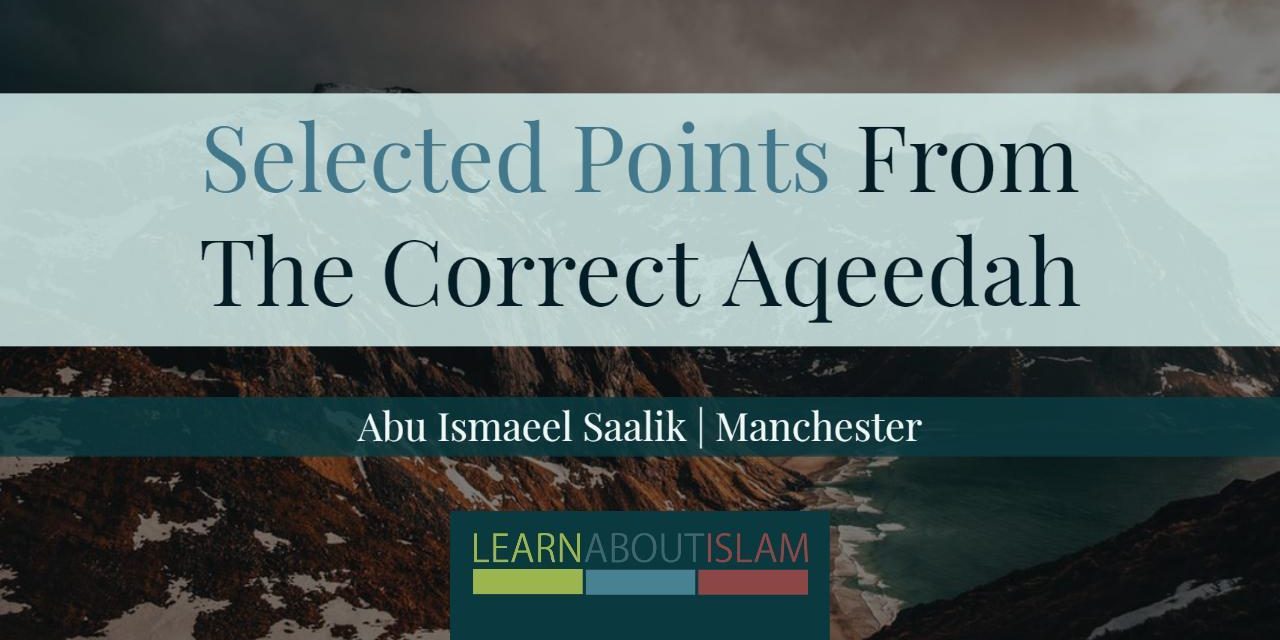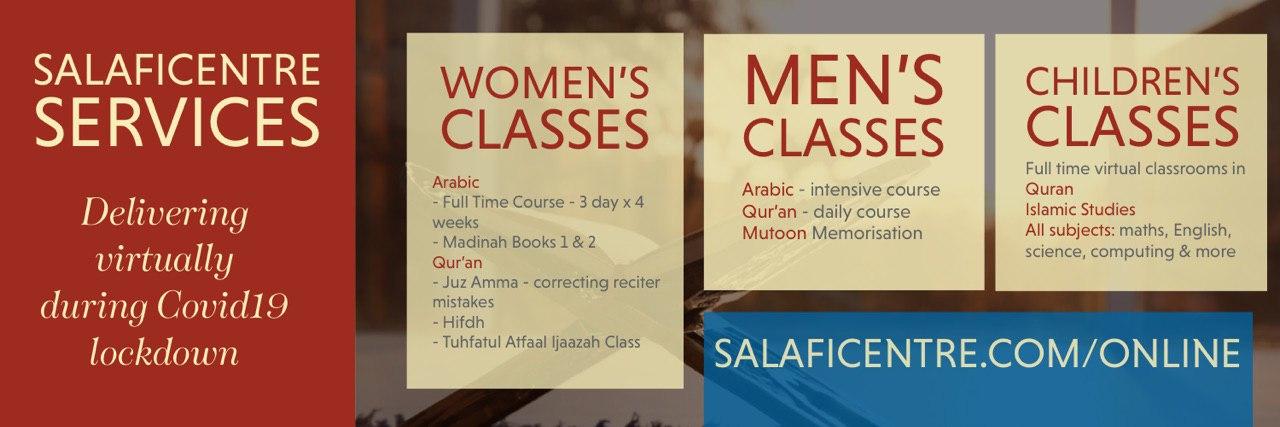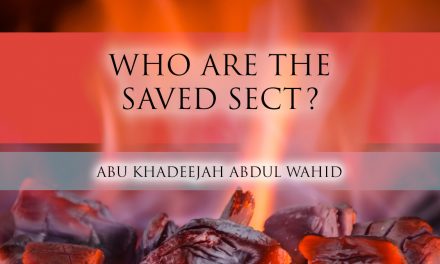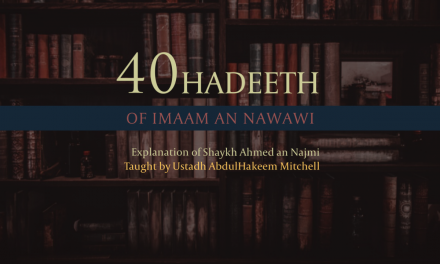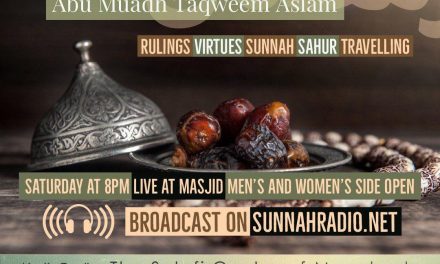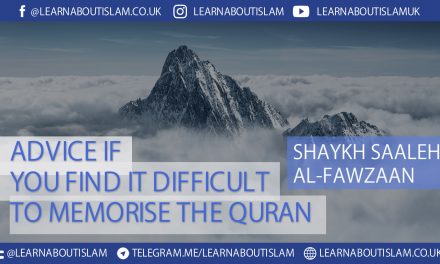In this series Ustaadh Abu Ismaeel goes through selected points from The Correct Aqeedah
-
LESSON 1
Having the correct belief and aqeedah is from the foundations of this religion. So when we reflect upon the Qur’an and what Allaah informed us of regarding the call of the Prophets and Messengers, we see that they focused on rectifying the Aqeedah of their people. So they would say: “O my people! Worship Allah! You have no other Ilah (God) but Him. (La ilaha ill-Allah: none has the right to be worshipped but Allah).” 7:65 That which is incumbent upon the people is to be diligent upon learning this belief, and teaching it in the schools and the masaajid. Up until it becomes firm in the people and its great importance becomes known to them. The intent is not to strive in worship without knowing Tawheed and having the correct belief. Another reason we should ensure our religion is correct is because, if it is incorrect, then all of our actions will be of no benefit. Allaah has favoured our Ummah over other religions. From the favours is Allaah has preserved our religion, He says in the Quran: “Verily We: It is We Who have sent down the Dhikr (i.e. the Quran) and surely, We will guard it (from corruption).”15:9 It was preserved by the Prophet Sallallaahu Alayhi Wa Sallam, and then his companions, and then the Taabi’in (Students of the Companions) after them it was preserved by those who followed them in goodness. It was in the time of the Tabi’in that the corrupt beliefs started to enter into the religion, so they fought against it. Introduction of the Book: “The one who opposes this methodology (what is to be mentioned in this book), or speaks ill of it, or belittles the one who speaks with this methodology. Then this person is an opposer, an innovator, outside the folds of the “Jamaa’ah” (main body of muslims), somebody who has erred and gone astray. “ That which they were united upon: 1. “Iman is statement, action, intention and clinging to the sunnah. It increases and decreases.” o It is to believe in the existence of Allaah, that He is the Ever Living, the First (None before Him) and the Last (None after Him). o It is to believe in His Ruboobiyyah – that He is the Creator, Maintainer, Sustainer. o It is to believe in His Uloohiyyah – that He alone is worthy of worship (I.e. reliance, sacrificing and others) o It is to believe in His Perfect Names and Lofty Attributes – We believe in them in a general sense and likewise in a specific sense (those mentioned specifically in the Qur’an and Sunnah). We do not resemble them to creation, nor liken them to creation, nor distort them, nor change their meanings. o All of the Imams believed in this explanation of Iman, the terminology used to describe it may have differed, but the reality of the belief was always the same. o It increases with obedience to Allaah and decreases with the disobedience of Allaah. o Some of the early generation started to oppose this understanding. From them; The Jahmiyyah and the Murji’ah. As a result, he begins to describe the ruling upon those who oppose this understanding of Iman. Firstly, the Jahmiyyah – they say Iman is only to have belief in the heart, not statements nor actions. Secondly, the Karaamiyyah – they say Iman is only utterance upon the tongue. Thirdly, the Ashaa’irah – they, like the Jahmiyyah, say Iman is only belief in the heart. Fourthly, the Murjiatul Fuqahaa – they say Iman is statements and belief, but exclude actions from Iman. o A proof for theincrease and decrease in Iman is the saying of Prophet Sallallaahu Alayhi Wa Sallam: “Take out from the Fire, those who had in the hearts, the equivalent of a mustard seed of Iman” o Saying “I am a believer if Allaah wills” is a sunnah of the scholars of the past. The Murji’ah use to say you cannot say this. If a person says this out of doubt, then clearly it is impermissible. However, saying it out of humility, not wanting to testify to one’s own Iman. Or to say that his faith is not like that of the angels, then this is acceptable.
-
LESSON 2
After establishing the understanding of Eemaan, Imam Harb bin Ismaaeel Al Kirmaani moved on to discussing the affair of Qadr (Divine Predecree), which is what was discussed in this lesson. From the benefits mentioned by the Imam in his book; -It is from the 6 fundamental beliefs of Imaan. -We must believe in its good and evil. Whether its large or small, sweet or bitter, whats open and whats hidden. It is all from Allaah, he has ordained it for His slaves. It does not bypass anybody nor does it escape them. Everyone is heading to that which they are created for. This is all from the justice of Allaah Azza wa Jal. -Allaah commanded the pen to write everything that is to occur, 50000 years before the creation of the universe. Everything in relation to the Heavens and the Earth. Allaah had knowledge of all of this before it was brought into creation. A persons lifespan, his rizq (provisions, wealth,etc), his actions and whether he will be happy or miserable in this life and the Hereafter are all written and are part of belief in the Qadr. -Those who opposed this correct belief are the innovated group known as the “Qadariyyah”. They say the persons actions are not created by Allaah, a person creates their own actions. They have been named as the Fire Worshippers of this Ummah (As they claim there are 2 creators; the creator of good and the creator of evil). The Qadariyyah went even further, they say mankind are responsible for creating their own actions, attributing an Action of Allaah to the creation, this is shirk (associating partners with Allaah.) -Another group who opposed this belief is the deviant group known as the “Jabarriyah”. They say mankind is forced and have no free will over their actions. The refutation of this belief is the ayah: “He gets reward for that (good) which he has earned, and he is punished for that (evil) which he has earned. ” 2:286 -The texts support the belief of Ahlus Sunnah Wal Jamaa’ah; Allaah says: “Verily, We have created all things with Qadar” 54:4. “And you will not, unless (it be) that Allah wills, the Lord of the ‘Alamin (mankind, jinns and all that exists).” 81:29 -We say Allaah had knowledge of everything from the start of time to the end. Nothing will differ from what has been written. Mankind has free will over their actions, however this free will comes under the bounds of what Allaah has decreed. -The pen wrote all of the affairs in Al Lawh Al Mahfoodh (The Preserved Tablet). -Fornication, theft, murder, shirk and other sins and disobedience are all from the decree of Allaah and that which He has ordained. Despite this, none can use this as a proof against Allaah azza wa Jal. He is not questioned, rather we are questioned as per the ayah: “He cannot be questioned as to what He does, while they will be questioned.” 21:23 -Allaah did not leave us to our own intellects, rather He sent us Prophet’s and Messengers and Books, making clear what is pleasing to Allaah and what is displeasing to Him. So we are all responsible for choosing to perform good or evil deeds. He sent a warner to every nation, the evidence is: “Messengers as bearers of good news as well as of warning in order that mankind should have no plea against Allah after the Messengers” 4:165 “And there never was a nation but a warner had passed among them.” 35:24 -Allaah knew who would be from the people of Paradise and who would be from the people of Hellfire. -Allaah had fore knowledge of the creation, He knew the disobedience of the people of disobedience so He created the disobedience for them. He knew the obedience of the people of obedience so He created obedience for them. -If everything has already been written, why should we do anything? The Prophet Sallallaahu Alayhi Wa Sallam was asked this and he said: “No, perform deeds, for indeed the actions which the person is created for will be made easy for him” Meaning, good deeds will be made easy for the person of good and vice versa. So we should strive to do good.
-
Lesson 3
What is Jihad? To fight, to strive, to work hard, to face hardship and difficulty are all meanings of Jihad in the Arabic language. In the shari’ah: “It is to offer that which one is able to within one’s abilities in order to attain that which is beloved to Allaah and to repel that which is disliked by Him” – Ibn Taymiyyah Ibnul Qayyim mentions 4 types of Jihad: 1. Jihad An Nafs – Striving against oneself 2. Jihad Ash Shaytaan – Striving against Shaytaan 3. Jihad Ahlul Kufr wa Ash Shirk – Striving against the People of Kufr and Shirk. It has rules and regulations which we will come to in Shaa Allaah. 4. Jihad Ahlul Bidah wal Fisq – Striving against People of Innovation and Sins. The greatest of these is Jihad An Nafs. Learning this religion, implementing and actualizing what you have learnt, calling to it and being patient upon it. As Allaah says: “But strive against them with the utmost endeavour, with it (the Quran)” (25:52) The Prophet implemented Jihad An Nafs whilst he was in Makkah before migrating to Madinah. Shaykh Zayd: “Before carrying out Jihad with weapons, one must carry out Jihad of textual evidences from the Quran and Sunnah. This is given precedence over Jihad with weapons. The proof must be taught to the people and be established over the people first.” When the Prophet sent Muadh to Yemen he told him to teach the people Tawheed first and if they accept this then to teach them the other affairs of the religion. He did not order him to fight with the sword first. This type of Jihad is the responsibility of the People of Knowledge. Just as Jihad is of different types, likewise the people are of different types. And each type requires a different approach from the people of knowledge in relation to “Jihad Al Burhaan” upon them: 1. People of Kufr and Shirk – The people of Knowledge clarify that which Islam is about, the foundations of Islam and Iman. Making it clear to them. Informing them of that which is prepared for those who die as Muslims and for those who die as non-Muslims. 2. Hypocrites – Those who outwardly express Islam, yet inwardly they conceal a hatred and rejection of Islam. People of Knowledge explain to them that they must practice and accept Islam sincerely and wholly, expressing it externally through their righteous deeds. 3. People of Innovation and Misguidance – Those who oppose Ahlus Sunnah Wal Jama’ah. People of knowledge explain to them the authentic teachings, and pure sunnah. They explain the danger and evil of innovating into the religion. So that the innovations that they are upon may be abandoned. 4. People of Major sins – People of Knowledge clarify to them the evils of these actions, giving them glad tidings of the fact that Allaah will forgive their sins both Major AND Minor sins if they turn to Allaah sincerely in repentance. Allaah says: “If you avoid the great sins which you are forbidden to do, We shall remit from you your (small) sins, and admit you to a Noble Entrance (i.e. Paradise).” (4:31) On top of this Allaah will also replace their evil deeds with good deeds. As He says: “Except those who repent and believe (in Islamic Monotheism), and do righteous deeds, for those, Allah will change their sins into good deeds, and Allah is Oft-Forgiving, Most Merciful” (25:70)
